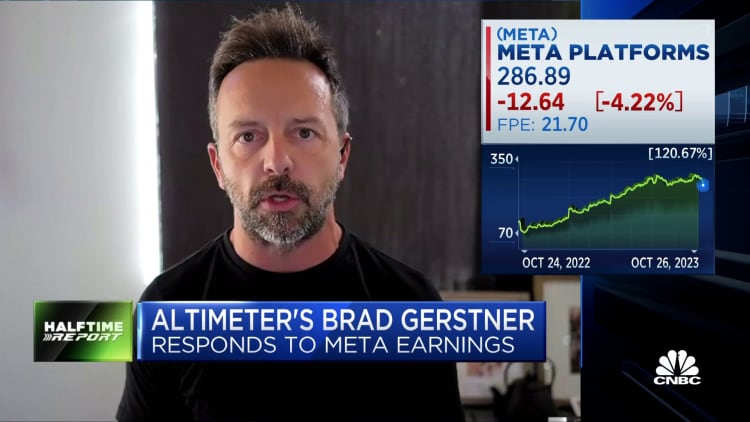A banner for the online image board Pinterest Inc. hangs from the New York Stock Exchange on the morning Pinterest made its initial public offering, April 18, 2019.
Spencer Platt | Getty Images
Pinterest reported third-quarter earnings on Monday that beat on the top and bottom lines. The stock jumped 14% in extended trading.
Here’s how the company did:
- Revenue: $763.2 million vs. $743.5 million expected, according to LSEG, formerly known as Refinitiv.
- Earnings: 28 cents per share, adjusted, vs. 20 cents expected, according to LSEG.
Pinterest’s revenue increased 11% from $684.6 million in the third quarter of 2022.
The number of global monthly active users in the quarter rose 8% from a year earlier to 482 million. Analysts were expecting Pinterest to report 473 million global monthly active users. Average revenue per user was $1.61, which was higher than analysts’ projections of $1.59.
“As we lean into Pinterest’s unique differentiators as a visual search, discovery, and shopping platform, we’re finding our best product market fit in years,” Pinterest CEO Bill Ready said in a statement. “Our users are engaging deeply and we’re delivering better results for advertisers through improved measurement and innovation across the full funnel.”
For the fourth quarter, Pinterest said it expects revenue growth of 11% to 13%. The midpoint is higher than analyst estimates, which call for growth of 11.3%, according to LSEG.
Last week, Meta reported better-than-expected third-quarter financial results, but its stock price dropped over 3% after finance chief Susan Li told analysts the company “observed softer ads in the beginning of the fourth quarter” due to the Israel-Hamas war.
Because of the volatility surrounding the Middle East crisis, Meta widened its fourth-quarter revenue guidance range. Snap also noted some detrimental effects from the Israel-Hamas war in its earnings report last week, and said it wouldn’t provide official fourth-quarter guidance “due to the unpredictable nature of war.”
Snap said it “observed pauses in spending from a large number of primarily brand-oriented advertising campaigns immediately following the onset of the war in the Middle East.”
In a call with analysts on Monday, Ready acknowledged the impact of the Middle East crisis, saying that “advertisers do react to major geopolitical moments.”
Ready said concerns over the Israel-Hamas war caused some brand advertisers to temporarily pause spending, but he noted that Pinterest has since seen big advertisers return. If the crisis worsens, he expects that “platforms skewing more to brand awareness would be more impacted than us,” underscoring Pinterest’s efforts to increasingly focus on shopping, as exemplified by its recent partnership with Amazon.
Amazon said last week in its third-quarter earnings report that sales in its online advertising unit grew 26% year over year to $12.06 billion.
Still, Ready said that if the Middle East crisis deepens, resulting in more advertisers pausing their online promotional and marketing campaigns, the company “won’t be immune” to a drop-off.
Pinterest swung to a net income of $6.73 million, or a penny a share, from a loss of $65.2 million, or 10 cents a share, during the year-earlier period.
Expenses in the quarter rose nearly 2% to $768.2 million from the $753.9 million a year earlier. The company said its fourth-quarter 2023 non-GAAP operating expenses, which don’t include the costs of revenue, will decline in the range of 9% to 13% year over year.
WATCH: Meta has regained the confidence of investors, says Altimeter’s Brad Gerstner

